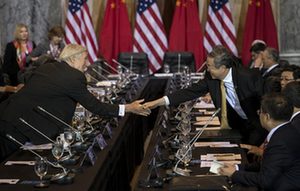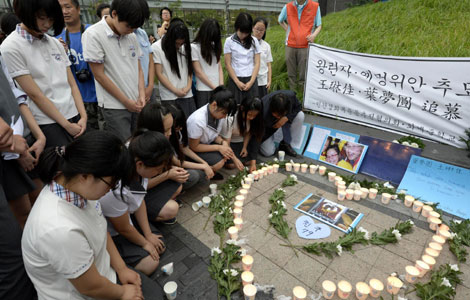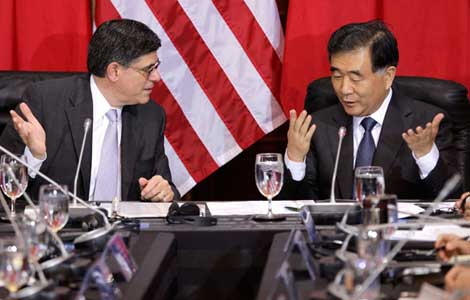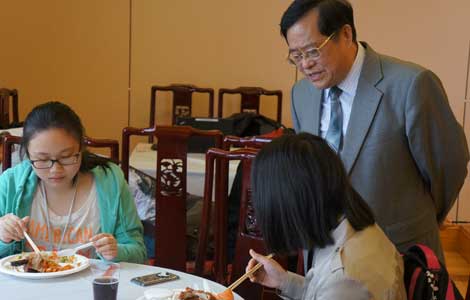China's economy caught in balancing act
Updated: 2013-07-12 16:13
(Xinhua)
|
||||||||
BEIJING - Attempting to balance economic development in the face of a global meltdown with reform efforts that will likely slow the economy is proving to be difficult for Chinese authorities.
However, Premier Li Keqiang gave some suggestions on dealing with the conundrum in a speech delivered during an inspection tour of south China.
"Economic operations should be managed in such a way that ensures that the growth rate, employment and other indicators don't slip below the lower limit and inflation does not exceed the upper limit. In such circumstances, the country can focus on restructuring and reform," he said.
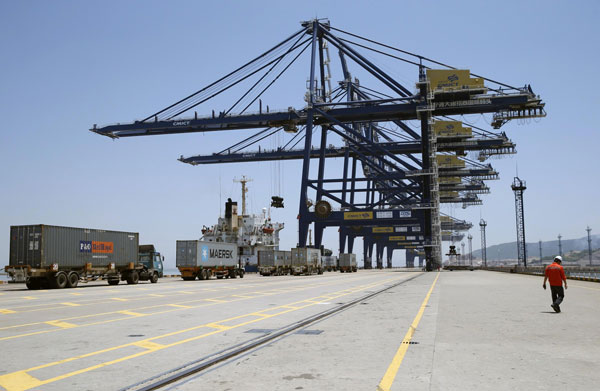 |
|
A worker walks past trucks as they line up to upload containers onto a ship at a port in Ningbo, Zhejiang province in this July 9, 2013 file photograph. [Photo/Agencies] |
Li's statement, as perceived by analysts, has shown to what extent the government will tolerate an economic slowdown.
"The possibility of a dramatic economic fall is small. The government has the bottom line in mind -- employment and social stability are important references," said Zhuang Jian, an economist at the Asian Development Bank.
China's stock markets have responded with drastic gains in the past two days, although official data released during the period showed year-on-year drops in June exports. The fading trade growth has renewed worries of a further slowdown in China's second-quarter growth.
Concerns that the economy might stall were renewed after the country's central bank refused to inject liquidity to ease a cash shortage crisis that pushed interbank borrowing rates into the double-digits in June.
The government's calm has drawn criticism, as a cutback in credit is likely to weigh on investment, another key growth driver, and will therefore put pressure on the economy.
However, Zhuang said there is no need to worry too much as long as the slowdown does not quicken.
"The new government seems to be less interested in the speed of economic growth. The focus is now on fixing problems in the economic growth pattern," he said.
Despite years of reform, China has never truly succeeded in getting rid of the high-input, high-pollution growth mode. After going through the turmoil of the 2008 global financial crisis, the government realized that stimulus policies only prolong economic changes and that it must stay the course regarding economic reform.
After coming into office in March, the new government has refrained from stimulus, moved to streamline administrative systems and vowed to use indicators of people's welfare, social progress and ecological benefits when assessing the performance of government officials.
The leaders will not allow a sudden slowdown, but it does not want to return to the old path either, Zhuang said.
Zhang Yansheng, a researcher at the National Development and Reform Commission, warned that China will risk losing the opportunity to acquire long-term growth potential and global competitiveness if it does not reform and adjust.
Zhang offered a different perspective on the slowdown, saying that while China's growth slid to a 13-year low last year, its urban employment reached the highest level of the past decade, final consumption contributed more to the economy than investment did and residential incomes rose faster than the economy.
"It will make for fine growth if these indicators are still good," he said.
Official data showed that the country's labor market remains robust. Demand for workers healthily outstripped supply in the second quarter of the year, as there were 107 job opportunities for every 100 job seekers.
Li's speech did not define the government's limits, but some economists believe that the economy can still expand by around 7 percent without government stimulus.
"The growth momentum gained from the processes of industrialization and urbanization alone will support the country's steady growth," said Zhang Liqun, a researcher at the Development Research Center of the State Council.
The cash crisis showed that reforms are more crucial than ever in the country's efforts to defuse long-term economic risks, he said.
Most Viewed
Editor's Picks

|

|

|

|

|

|
Today's Top News
China, US explore new treaty
Saudi princess charged with US human trafficking
Asiana takes out apology ad in Chinese media
Asia spending too little on poor: report
China, Russia consider increasing naval drills
No mechanical trouble on Asiana
More Americans favor immigration
Increased cooperation brings benefits
US Weekly

|

|
